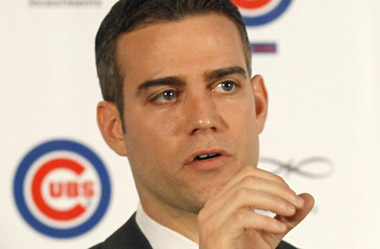Concerned fans want to know: Is Theo a communist?
Though our sports culture is scrutinized by so many over-analyzing media outlets, issues of team ownership and the business of sports don’t receive the attention they deserve. That changed for a couple of minutes during a recent interview with former Sox GM Theo Epstein, and the exchange should neither be ignored nor oversimplified.
Around 10 minutes into an interview on WEEI Sports Radio’s Dennis and Callahan Show (that would be dyed-in-the-wool-conservative Gerry Callahan), current Chicago Cubs President of Baseball Operations and former Red Sox General Manager Theo Epstein addressed the dichotomy between winning and making money that often exists in professional sports, even going so far as to “blame [it] on capitalism.”
Epstein envisions a method of operating baseball teams via municipalities, where the emphasis is on winning—and being a treasured aspect of a community—as opposed to making money.
“There are no villains. There’s just people doing their jobs—the reality of a big business,” Epstein offered. “There are lots of barometers for a baseball organization. Wins and losses. And it’s also a business. So, yeah, ratings is an important barometer, revenues, tickets sold, sellouts, all that stuff. And there’s a big part of the business that has to measure itself. And you have to maintain where you’re at, and you have to continue to grow.
“I blame that on capitalism, personally. It’s part of the nature of a baseball team being a business. Maybe one day we’ll all be owned by municipalities or something, and we don’t have to turn a profit, we don’t have to be a business. But that’s the reality of it. There were no villains; it’s just a natural dynamic that occurs in every sports organization.”
It’s too easy to view this exchange in the political bumper sticker lexicon of communism vs. capitalism, especially when the insight offered by Epstein highlights an essential truth about the business of professional sports that most fans don’t want to consider: the financial success of owners and the competitive success of teams don’t always go together.
Consider, for example, the baseball operations documents for the Pittsburgh Pirates, Florida Marlins and Tampa Bay Rays that were obtained and released by Deadspin.com two summers ago. All three are considered “small market” teams and work with a small payroll, which usually corresponds to a bad baseball team on the field. (While the Rays have proved to be consistently competitive on the field for the past several seasons, the Pirates and Marlins, like most small market teams, seem incapable of that feat.)
Yet all three organizations are successful financially. And they manage this in a variety of ways. For example, every baseball team benefits by receiving a percentage of the league’s luxury tax when big-market teams like the Red Sox or the Yankees go over the mandated salary cap. If the money is not put back onto the field in the form of better, higher-paid players, the transaction can prove quite profitable for a small market team, and especially for its owners, who get to keep the money even if they don’t choose to reinvest it in the team.
“If there is a thread running through all of these financial statements,” the Deadspin post reads, “it is the incredible ability of baseball teams—whether they’re winners or losers, big market or small, ‘rich’ or ‘poor’—to make their owners a fat pile of money.”
The current NBA finals between the Miami Heat and the Oklahoma City Thunder also reek of owners’ putting their own interests ahead of those of the fans.
It’s easy, unless you live in Washington state, to forget that as recently as five years ago, perennial league-scoring champion Kevin Durant was playing for the Seattle Supersonics, and the Thunder franchise was just a twinkle in the eyes of Oklahoma billionaires Clay Bennett and Aubrey McClendon. But then the good folks of Seattle refused to allocate their tax dollars to pay for a new basketball gym, and NBA Commissioner David Stern helped engineer the team’s move to Oklahoma City to help boost his league’s red state appeal.
“[The Supersonics] were a beloved team in a basketball town,” Dave Zirin writes in The Nation. “[Residents] loved their team but refused to pay for a new taxpayer-funded $300 million arena. Seattle’s citizens voted down referendums, organized meetings and held rallies with the goal of keeping the team housed in a perfectly good building called the KeyArena.” (The KeyArena continues to serve Seattle’s WNBA franchise, the Storm, just fine.)
Sonics fans and Seattle citizens put up a good fight, but the powers at work were too great. Supersonics owner and Starbucks founder Howard Schultz sold Seattle’s franchise to McClendon and Bennett and—no shocker here—the newly minted owners moved the team to their home state of Oklahoma. The move fit in perfectly with Stern’s plan to make his majority African-American league become more profitable by gaining more red state appeal.
“Stern is a political liberal who has sat on the board of the NAACP. Bennett and McLendon are big Republican moneymen whose hobby is funding anti-gay referendums,” continues Zirin. “Yet these three men are united in their addiction to our tax dollars.”
The fact that big-time professional sports teams are big-time businesses is not news. But if owners are capable of turning a profit regardless of how successful their team is, there seems to be an inherent conflict of interest at play. What does the future hold for an institution built on the timeless tenets of competition that is run according to the financial dictates of the next quarter’s get-rich(er)-quick(er) scheme?
Theo Epstein is right. Municipal and other forms of ownership deserve honest consideration. Our sports culture certainly has the media capacity to field such questions.



